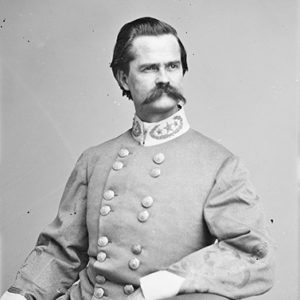calsfoundation@cals.org
William Nelson Rector Beall (1825–1883)
William Nelson Rector Beall served as a Confederate brigadier general from Arkansas during the Civil War. He most notably served as an agent for the Confederate government to raise funds to purchase supplies for Confederate troops held in Federal prisons.
William Beall was born on March 20, 1825, in Bardstown, Kentucky, the son of Samuel Beall and Sally Rector Beall. Sally Beall was a member of the Rector family, which was prominent in Arkansas politics. The Bealls moved to Arkansas in 1840, settling in Little Rock (Pulaski County). Both of Beall’s parents died soon thereafter, orphaning him and his four siblings.
Beall graduated from the United States Military Academy at West Point in 1848, ranking thirtieth in a class of thirty-eight. He entered active service with the army as a brevet second lieutenant assigned to the Fourth Infantry. Promoted the next year to second lieutenant, Beall transferred to the Fifth Infantry and served in Texas and the Indian Territory (present-day Oklahoma). Promoted to first lieutenant and then captain in March 1855, Beall transferred to the First Cavalry, serving in the Kansas Territory.
With the outbreak of hostilities in 1861, Beall continued to serve with his unit and was transferred to Fort Kearny, Nebraska. Even after Arkansas seceded in May, Beall remained with his unit, resigning only in August 1861, one of the last Union officers to do so. He was quickly commissioned into the Confederate army with the rank of captain. Moving into a series of staff positions, Beall served under General Albert Sidney Johnston in Memphis, Tennessee, and Major General Earl Van Dorn in Little Rock. After the Battle of Pea Ridge, Van Dorn led his troops out of Arkansas and across the Mississippi to join Confederate forces in the Western Theater. Beall accompanied him and was promoted to colonel in March 1862, with a further promotion to brigadier general in April. He commanded cavalry units around Corinth, Mississippi, before moving into administrative duties as the commander of the Second District of the Department of Southern Mississippi and Eastern Louisiana and the District of East Louisiana. On August 29, Beall took command of the Confederate post at Port Hudson, Louisiana, where he continued work on fortifications along the Mississippi River. Relieved of command of the post in December 1862, Beall continued to lead a brigade at Port Hudson. A Union army force under the command of Major General Nathaniel Banks moved against Port Hudson in May 1863 in conjunction with an ongoing siege of Vicksburg, Mississippi. Port Hudson fell to Federal forces on July 9, 1863, five days after the surrender of Vicksburg. Beall and his entire command, including seven regiments and parts of two others from Arkansas, were captured.
Beall and other captured officers were sent north to Memphis, where he spent time in the hospital recovering from sickness. Eventually, Beall and many of his fellow officers arrived at Johnson’s Island, Ohio, located on Lake Erie. Beall quickly became involved in relief efforts, obtaining items for the prison hospital. In an effort to supply Confederate troops held in Union prison camps across the North, Beall was appointed as chief receiving agent in a scheme that allowed Confederate cotton to be sold in the North or to European countries, with the proceeds used for prisoner welfare.
Beall was paroled on December 6, 1864, and gave an oath that he would not escape or provide assistance to Confederate forces. Obtaining an office in New York City, Beall received requests for specific items from prison camps across the country before advertising among vendors to fill the orders. Beall meanwhile was forced to wait on the arrival of the cotton from the South. When the public in New York City became aware that a Confederate officer was operating in the city, there was an outcry. Beall’s parole was revoked by Secretary of War Edwin Stanton, and he was placed under guard at Fort Lafayette in New York Harbor until the shipment of cotton arrived. Once the cotton was delivered, Beall was released and began to make shipments of supplies bought with the proceeds of the sale of the cotton to prisoner-of-war camps. He continued to perform these duties until the end of the war and was released in August 1865.
Beall moved to St. Louis, Missouri, where he worked as a merchant. He married Felicia Eakins Bass; they had four children. He died in McMinnville, Tennessee, on July 26, 1883, and is buried in Mount Olivet Cemetery in Nashville, Tennessee.
For additional information:
Allardice, Bruce. Kentuckians in Gray: Confederate Generals and Field Officers of the Bluegrass State. Lexington: University of Kentucky Press, 2008.
Hewitt, Lawrence. Port Hudson: Confederate Bastion on the Mississippi. Baton Rouge: Louisiana State University Press, 1987.
Warner, Ezra. Generals in Gray. Baton Rouge: Louisiana State University Press, 1959.
David Sesser
Henderson State University
 Military
Military William Beall
William Beall 




Comments
No comments on this entry yet.